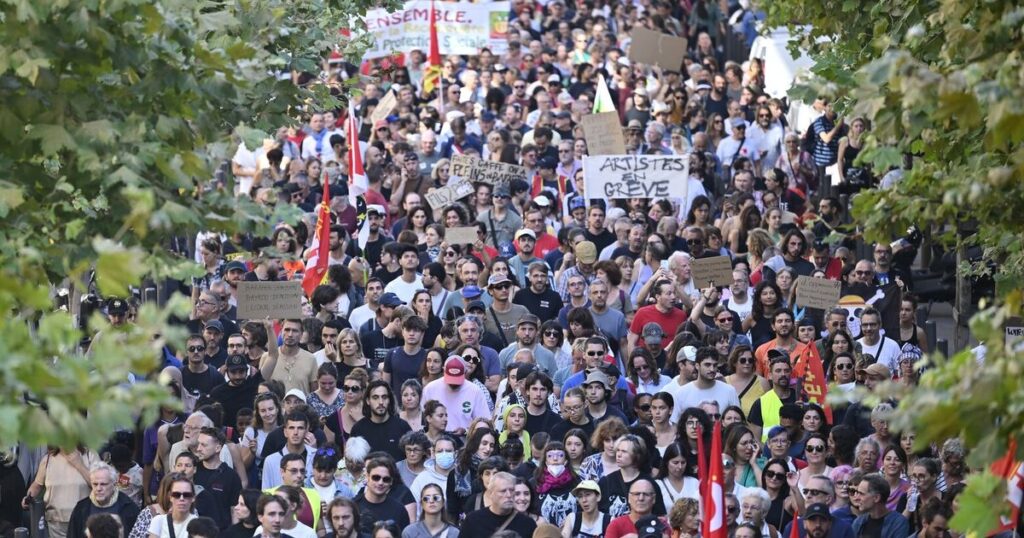PARIS (AP) — Protesters blocked roads, lit blazes and were met with volleys of tear gas on Wednesday in Paris and elsewhere in France, heaping pressure on President Emmanuel Macron and making new Prime Minister Sébastien Lecornu ‘s first day in office a baptism of fire.
The government’s interior ministry announced 250 arrests in the first hours of what was a planned day of nationwide demonstrations against Macron, budget cuts and other complaints.
Although falling short of its self-declared intention to “Block Everything,” the protest movement that started online over the summer caused widespread hot spots of disruption, defying an exceptional deployment of 80,000 police who broke up barricades and swiftly made arrests.
Interior Minister Bruno Retailleau said that a bus was set on fire in the western city of Rennes. In the southwest, fire damage to electrical cables stopped train services on one line and disrupted traffic on another, government transport authorities said.
Spreading protests
The protests appeared so far to be less intense than previous bouts of unrest that have sporadically rocked Macron in both his first and ongoing second term as president. They included months of nationwide so-called yellow vest demonstrations against economic injustice in 2018-2019.
After his reelection in 2022, Macron faced firestorms of anger over unpopular pension reforms and nationwide unrest and rioting in 2023 after the deadly police shooting of a teenager on Paris’ outskirts.
Nevertheless, demonstrations and sporadic clashes with riot police in Paris and elsewhere Wednesday added to a sense of crisis that has again gripped France following its latest government collapse on Monday, when Prime Minister François Bayrou lost a parliamentary confidence vote.
Macron was installing Lecornu as prime minister on Tuesday, and the protests immediately presented him with a challenge.
Groups of protesters repeatedly tried to block Paris’ beltway during the morning rush hour and were dispersed by police and tear gas. Elsewhere in the capital, protesters piled up trash cans and hurled objects at police officers. Paris police reported 159 arrests through the morning.
Around 100 others were taken into police custody elsewhere in France, according to the interior ministry count. Road blockades, traffic slowdowns and other protests were widely spread — from the southern port city of Marseille to Lille and Caen in the north, and Nantes and Rennes in the west to Grenoble and Lyon in the southeast.
A weary nation
France’s prolonged cycle of political instability, with Macron’s minority governments lurching from crisis to crisis, has fueled widespread discontent that spilled onto the streets Wednesday.
Paris protester Aglawen Vega, a nurse and union delegate in a public hospital, said she wanted to defend France’s public services from privatization.
“We’re governed by robbers,” she said. “People are suffering, are finding it harder and harder to last out the month, to feed themselves. We’re becoming an impoverished nation.”
Vega said the anger that fueled the 2018 Yellow Vest protests never went away and pushed her to strike on Wednesday. She warned that today’s unrest has the makings of a broad social movement — one that could even tip into revolution.
Some criticized the disruptions.
“It’s a bit excessive,” said Bertrand Rivard, an accounting worker on his way to a meeting in Paris. “We live in a democracy and the people should not block the country because the government doesn’t take the right decisions.”
The “Bloquons Tout,” or “Block Everything,” movement gathered momentum over the summer on social media and in encrypted chats. Its call for a day of blockades, strikes, boycotts, demonstrations and other acts of protest came as Bayrou was preparing plans to massively slash public spending — by 44 billion euros ($51 billion) — to rein in France’s growing deficit and trillions in debts. He also proposed the elimination of two public holidays from the country’s annual calendar — which proved wildly unpopular.
Lecornu, the new prime minister who previously served as minister of defense, now inherits the task of addressing France’s budget difficulties, facing the same political instability and widespread hostility to Macron that contributed to Bayrou’s undoing.
Macron’s governments have been on particularly shaky ground since he dissolved the National Assembly last year, triggering an unscheduled legislative election that stacked the lower house of parliament with opponents of the French president.
A spontaneous movement
“Block Everything” grew virally online with no clear identified leadership and a broad array of complaints — many targeting budget cuts, broader inequality and Macron himself.
Retailleau, a conservative who allied with Macron’s centrist camp to serve as interior minister in Bayrou’s government and is now in a caretaker role until Lecornu puts his Cabinet together, alleged Wednesday that left-wing radicals have hijacked the protest movement, even though it has an apparent broad range of supporters. Appeals for non-violence accompanied its online protest calls.
Retailleau alleged that elected politicians who have backed the movement are attempting “to create a climate of insurrection in France” and he said some protesters appeared hell-bent on fighting with police.
“We have, in fact, small groups that are seasoned, mobile, often wearing masks and hoods, dressed in black, which in reality are the recognized signs, the DNA, of … extreme-left and ultra-left movements,” Retailleau said.
The spontaneity of “Block Everything” is reminiscent of the yellow vests. That movement started with workers camping out at traffic circles to protest a hike in fuel taxes, sporting high-visibility vests. It quickly spread to people across political, regional, social and generational divides angry at economic injustice and Macron’s leadership.

